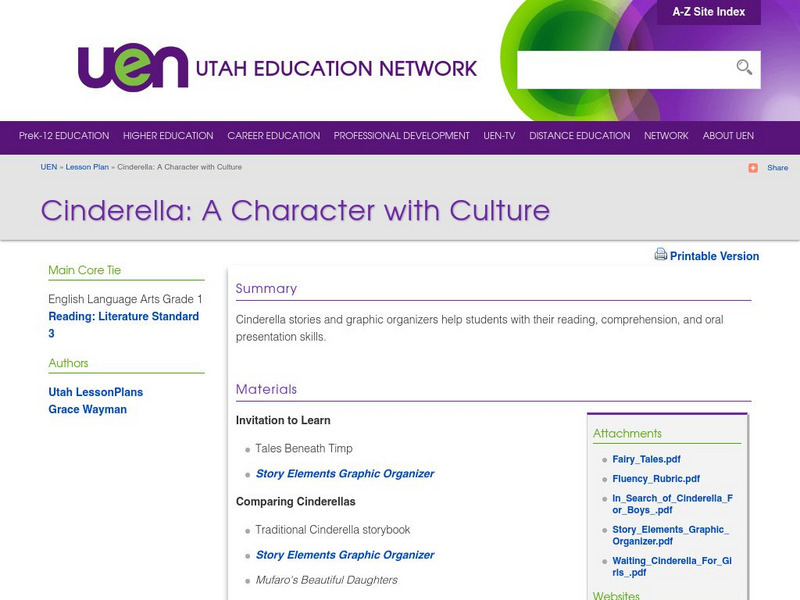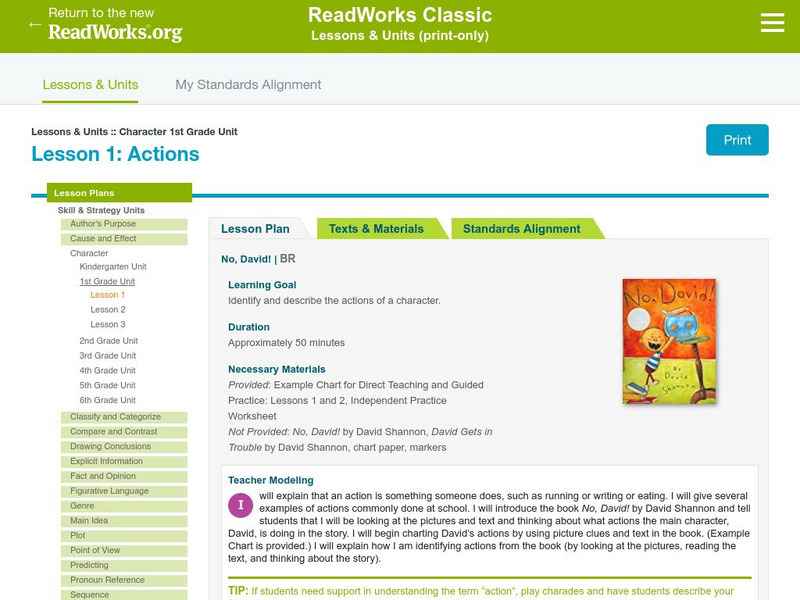Curated OER
Story Elements Test
In this story elements worksheet, students use the four terms in the wordbank and write in their numbers inside each box to indicate what type of element it is.
Curated OER
Story Elements
In this graphic organizer, students use the format of the worksheet to understand the elements in a story they have read. Students must know about plot and setting to complete the worksheet.
Curated OER
School-Home Links? Book Links 91
In this setting worksheet, students select a book, note the title and author, read the book with a family member and then draw a picture of the story's setting. Parents or guardians must sign the worksheet.
Curated OER
The Librarian from Conneaut School
Second graders identify the elements of the story "The Librarian from the Black Lagoon." They listen to the story and list the story elements of character, settling, problem, and solution. They then use KidPix to create individual...
Curated OER
Minnie and Moo and the Thanksgiving Tree
Third graders practice retelling stories. They read a story and work with a partner to discuss the key elements: characters, setting, events, beginning, and end. They assess one another as they retell the story. They rewrite the story in...
Curated OER
Multicultural Fairy Tales
Third graders explore the elements of a story using fairy tales from all over the world. They compare and contrast story elements, key ideas and concepts found in a variety of texts from around the world.
Curated OER
Story Stew -- Teaching Character, Plot, And Setting
Students examine the story elements of characters, plot, and setting. They identify the story elements from various "ingredients" taken out of a pot, and add their own story element "ingredients" on index cards into the pot.
Curated OER
Fairy Tales
Students read and analyze fairy tales. They discuss the story elements of a fairy tale, compare/contrast various fairy tales, complete an Anticipation Guide, and write an essay comparing the structure of a fairy tale to the structure of...
Curated OER
Speak What We Feel, Not What We Ought to Say
Students examine and create their own interpretation of a particular character from the play, King Lear. They read the speeches, write a paragraph about their character, and present a short performance of their scene.
Curated OER
"I am Not Well": Unspoken Endings and Unscripted Scenes
High schoolers analyze Act 4, scene 1 from the play, Merchant of Venice. They hypothesize the content of an unscripted moment and response, look for evidence in the text to support their hypothesis, rewrite the scene, and perform it for...
Curated OER
Creating a Book Review Using a Multimedia Stack
Third graders identify the title, character, setting and plot of a story they have read. They state their opinions of the story read and provide information about themselves as a reviewer, using Multimedia Software.
Curated OER
Character Traits
First graders watch a version of the story, The Tale of Peter Rabbit, and listen to the book, The Rainbow Fish, and identify the story elements of characters, character traits, setting, problem and solution.
Curated OER
B-movies and Plot: Story Elements, Writing, Media
Students use old "B-Movies" as a springboard to discuss and analyze traditional plot structures. They form groups and make their own 'movie' to demonstrate their knowledge.
ReadWriteThink
Read Write Think: Comics in the Classroom: Introduction to Narrative Structure
Contains plans for four lessons that teach students about narrative plot structures by using "The Three Little Pigs" fairy tale or a similar story. In addition to objectives and standards, this instructional plan contains links to sites...
PBS
Pbs Teachers: Story Writing With Arthur
This series of 12 downloadable activities teach students some basics of story writing, using books or videos from the PBS "Arthur" series as a springboard. Activities include creating story maps, asking questions about characters and...
Georgia Department of Education
Ga Virtual Learning: Contemporary Literature: The Modern Short Story
This lesson is an introduction to the modern short story including defining the short story, how the modern short story differs from the classic short story, the elements of a short story, and what is to be expected in this unit.
Annenberg Foundation
Annenberg Learner: Interactives: Elements of a Story
Explore the elements of a story using the well-known Cinderella story as source material. Learn about setting, character, sequence, exposition, conflict, climax, and resolution.
Utah Education Network
Uen: Cinderella: A Character With Culture
Students will engage in a Reader's Theater adaptation of Cinderella after reading several different versions that come from various cultures. Students will complete a graphic organizer with story elements that apply to the story Cinderella.
Annenberg Foundation
Annenberg Learner: Story Elements Using Cinderella
Listen to an explanation of the story elements in Cinderella including exposition, characters, setting, sequence, conflict, climax, and resolution.
CPALMS
Cpalms: Five Little Monkeys: Comparing and Contrasting
[Free Registration/Login Required] Five little monkeys sitting on a bed or sitting in a tree? In this close reading lesson, students will compare and contrast the actions of the characters in two of Eileen Christelow's beloved books,...
Better Lesson
Better Lesson: Miss Nelson Is Missing Key Details
Where did Miss Nelson go? We look at the key details in the text to determine what is happening throughout the story. Students will locate and record key details about story elements (characters, setting, problem, solution, and theme) in...
CPALMS
Cpalms: What's So Great About Kevin Henkes?
[Free Registration/Login Required] In this lesson, young scholars will serve as researchers of author/illustrator Kevin Henkes. With prompting, students will read three books by Kevin Henkes. They will recall information from the text to...
Read Works
Read Works: Lesson 1: Actions
In this resource, students will practice identifying and describing the actions of a character. Teachers will model these skills through the use of text and pictures from the story No, David! by David Shannon. Students will then draw a...



















